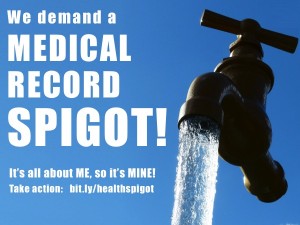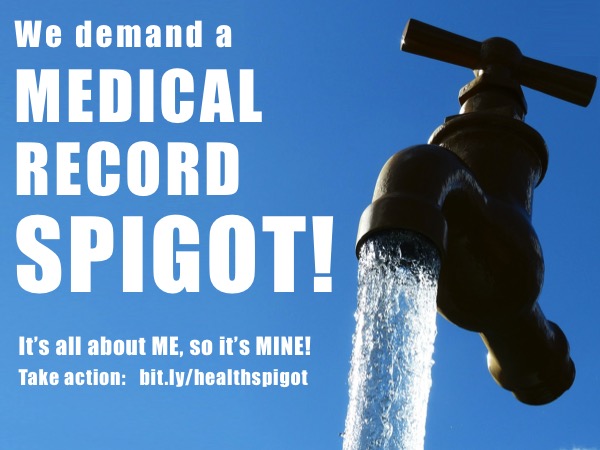 The GetMyHealthData site was taken down at the end of 2022. Updated links here go to the page’s history on Archive.org.
The GetMyHealthData site was taken down at the end of 2022. Updated links here go to the page’s history on Archive.org.
Please see my long-overdue post contributing to the @GetOurHealthData movement, on their blog.
The more I’ve thought about all the different issues around data transfer, meaningful use, APIs and everything, the more I’ve approached the inescapable conclusion that there’s only one answer: most medical record vendors say they’re paralyzed about this and too backlogged with other work, but we still have health problems to solve. So I say, we deserve a big freakin’ spigot attached to the EMRs, to just spew our data to us.
Not an endless series of “pretty please please give me my dying husband’s record, please” for an absurd amount of money (SPM pioneer Regina Holliday’s true story); a spigot so we just turn it on and it flows. To us – the people who have more need for it than anyone else, to manage our own and our families’ health.
I have many good friends in the health IT world who know many things about the difficulties of moving health data around. Fine: give it to us, in its raw form, and we’ll find vendors who can figure it out, if you folks in the industry can’t. Besides, I know you have a huge regulatory backlog of things you have to do – let us cope with the data; you just give it to us.
Give us a great big spewing medical record spigot. Give us our DaM data – Data About Me!







Just give us our data. We can use to the best of our knowledge or not. We can find those willing to interpret it or not. We can wait to understand the impact of those findings or not. We are the ones whose health and life is at stake. And we are grown ups.
Moment ago I read an article which addressed this very issue in terms of genetic findings which might lead many doctors and patients to assume that prophylactic double mastectomy is advisable, as those women with those mutations are thought to be at great risk of breast cancer. However, newer findings indicate that a subgroup within that larger group do NOT have just a great risk, and should not be treated as the larger group.
The researcher notes that keeping the complex data from those patients and doctors could lead to unnecessary surgery. Having the data available to the patient, even though it is yet to be completely understood, is may lead to better treatment and avert poor treatment.
Love this idea! Not being able to get one’s health info easily is definitely a big obstacle. I’m perpetually disheartened by what a pain it is for me as a physician to get records from other providers, and I know it’s ten times worse for non-clinicians.
I hope this idea gets traction.